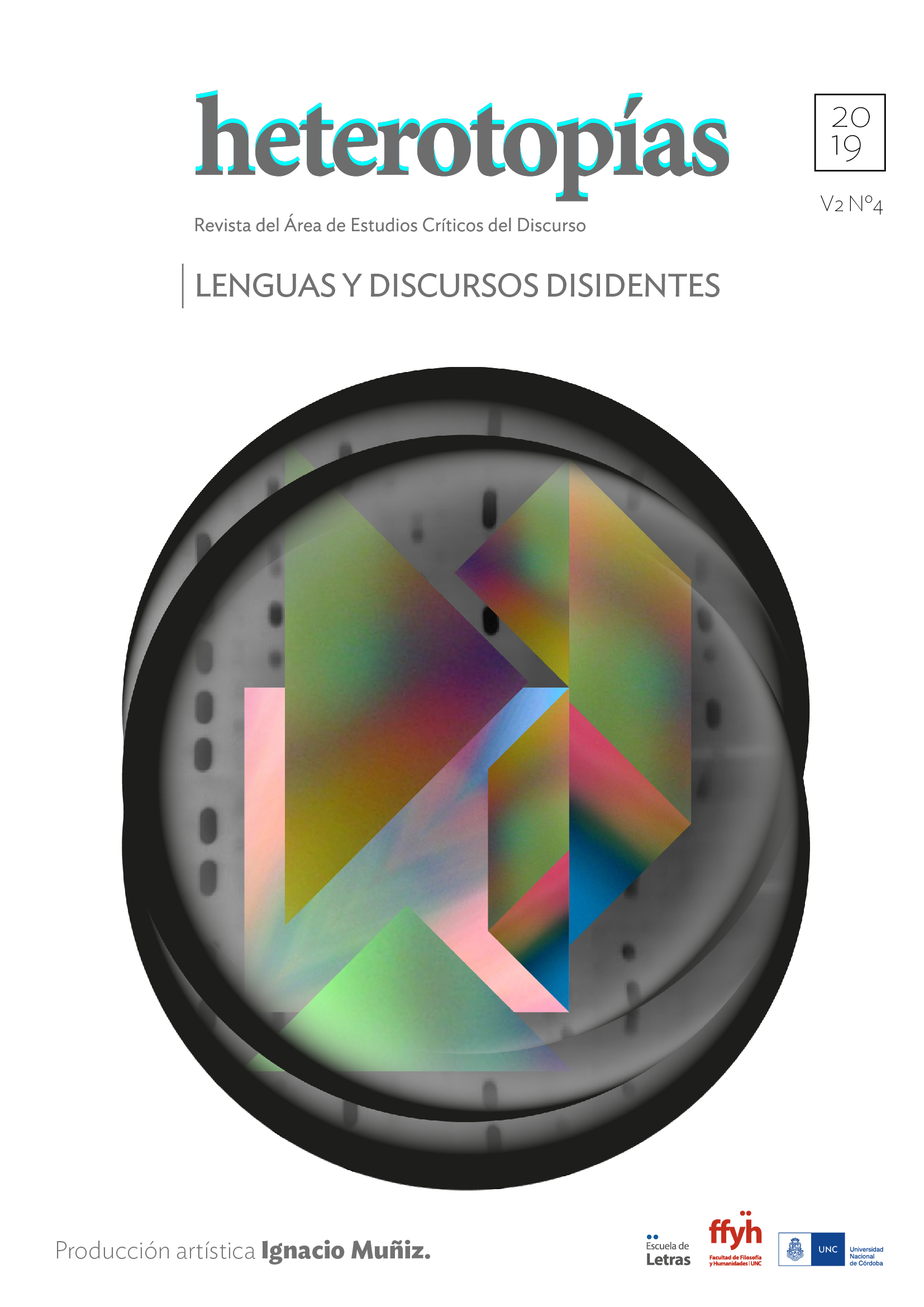“I have a scream” Enunciaciones disidentes en torno al 15M en España
Main Article Content
Abstract
In this article, we analyze the first Grito Mudo or Silent Scream —a collective act of disobedience committed by the Indignados movement in Madrid´s Puerta del Sol Square in May 2011— as a glottopolitical scene. In this act, the self-summoned multitude remained silent for one minute just before midnight, when the High Court´s sentence declaring the gathering illegal was to become effective. This collective performance brings together different discursive forms (including language, silence and bodies) to conflictually challenge the normative regimes that place limits on how political participation and democracy are conceived. Glottopolitical scenes, according to Elvira Arnoux, “alter to some degree that which is automatically accepted as well as communicative routines, and force those who are involved to engage in an interpretive action that accounts for the anomalous effect that was generated”. From this perspective, we analyze first how the indignados´ ritual is discursively established through the active rejection of the lettered forms that establish the political limits of liberal democracy —originating in legal discourse— according to Carl Schmitt and Walter Benjamin. We will then analyze the potencial of this gesture to shape, through its aesthetic and discursive form, a new collective political subject. The silent scream will then be analyzed in contrast with Spain´s New Year´s Eve grape-eating ritual, celebrated annually in the same urban space wrapped in similar aesthetic forms. Through De Certeau´s theory on the common´s daily political practices and, later, Turner´s theorization of “liminal states”, we will explain how the Silent Scream, on the basis of its ritual condition, expresses a new political subject and democratic ideal through a series of antidisciplinary practices where the aesthetic formulations of the multitude reinterpret, loosen and circumvent the limitations of official grammar.
Downloads
Article Details
Those authors who have publications with this journal, accept the following terms: Those authors who have publications with this journal, accept the following terms:
a. The authors will keep their copyright and guarantee to the journal the right of first publication of their work, which will be simultaneously subject to the Creative Commons Attribution - Non-Commercial - Share Alike (by-nc-sa) Attribution License; no commercial use of the original work or any derivative works is allowed, the distribution of which must be done with a license equal to the one that regulates the original work.
b. Authors may adopt other non-exclusive license agreements for the distribution of the published version of the work (e.g., deposit it in an institutional telematic archive or publish it in a monographic volume) provided that the initial publication in this journal is indicated.
c. Authors are allowed and recommended to disseminate their work through the Internet (e.g. in institutional telematic archives or on their website) before and during the submission process, which may lead to interesting exchanges and increase the number of citations of the published work. (See The effect of open access).
References
20minutos.es. “La Junta Electoral declara ilegales las manifestaciones en la jornada de reflexión y el 22-M”. 20minutos.es 20 mayo 2011 https://www.20minutos.es/noticia/1056432/0/junta-electoral/15m/manifestaciones/
Anderson, B. Comunidades imaginadas. Reflexiones sobre el origen y la difusión del nacionalismo. Fondo de Cultura Económica. 1993
Arnoux, E. N. de. Glotopolítica: delimitación del campo y discusiones actuales con particular
referencia a Sudamèrica”. En Lenka Zajícová y Radim Zámec (eds.): Lengua y
política en América Latina: Perspectivas actuales, Olomouc: Univerzita
Palackého v Olomouci. 19-43. 2014
Arnoux, E. N. de. Apuntes para el estudio de las ideologías lingüísticas: en torno a las representaciones del inglés en la Argentina. Abeache, Revista de la Asociación Brasilera de Hispanistas, n°13. 10-27. 2018
Bourdieu, P. ¿Qué significa hablar? Economía de los intercambios lingüísticos. Akal. 1985
Cano, G. “Dar cuerpo al espectro. Materiales sobre el 15M como campo de fuerzas.” Youkali 12 (2012) Web.
De Certeau, . La invención de lo cotidiano I. Arte de hacer. Universidad Iberoamericana. 2000.
Del Valle, José. ”La perspectiva glotopolítica y la normatividad”. Anuario de Glotopolítica 1. 17-40. 2017. https://issuu.com/agloanuariodeglotopolitica/docs/aglo_selection/1?ff=true
Deleuze, G. y F. Guattari. Mil mesetas. Capitalismo y esquizofrenia. Pre-textos. 2002
Elmundo.es. “La Junta Electoral prohíbe todas las protestas del sábado y el domingo” 20 mayo 2011. Elmundo.es https://www.elmundo.es/elmundo/2011/05/19/espana/1305840030.html
Europa Press. “'Toma la Plaza' respeta decisión de la JEC pero reitera que no han convocado manifestaciones para el fin de semana” Europa Press. 20 mayo 2011. https://www.europapress.es/madrid/noticia-toma-plaza-respeta-decision-jec-reitera-no-convocado-manifestaciones-fin-semana-20110520113431.html
Fernández Sabater, A. “Apuntes de acampadasol (2)”. Fuera de lugar. Blog Público. Público. 21 mayo 2011 https://blogs.publico.es/fueradelugar/387/apuntes-de-acampadasol-2?doing_wp_cron=1570713886.3940329551696777343750
Garcés, M. Un mundo común. Edicions Bellaterra. 2013
Kertzer, D. I. “The Power of Rites”. En Ritual, Politics, and Power. Yale University Press. 1988
Legare, C. H. y A. L. Souza. “Evaluating ritual efficacy: Evidence from the supernatural”. Cognition, 124 (1) (2012), pp. 1-15
Martínez Ahrens, J. “Por qué tiene éxito el Movimiento 15-M”. El País. 19 Mayo 2011. https://elpais.com/politica/2011/05/19/actualidad/1305797409_027958.html
Medina, A. “De flujos, lugares y peceras: Mutaciones y permutaciones ‘de cualquiera’ en el 15M” Journal of Spanish Cultural Studies. vol 16. Issue 3. 2015. 293-316.
Schmitt, C. Teología política. Trotta. 2009
Sánchez Vicente, T. “España, un país de ‘clase mileurista’”. ABC. 5 julio 2011. https://www.abc.es/economia/abci-mileuristas-201106290000_noticia.html
Tres instantes, un grito. dir. Cecilia Barriga. Hualqui Audiovisual & Cecilia Barriga. 2013
Turner, V. W. El proceso ritual. Estructura y antiestructura. Taurus. 1988
Whitehouse, Harvey y Jonathan A. Lanman. “The Ties That Bind Us. Ritual, Fusion, and Identification” Current Anthropology, Vol. 55, No. 6 (December 2014), pp. 674-695
